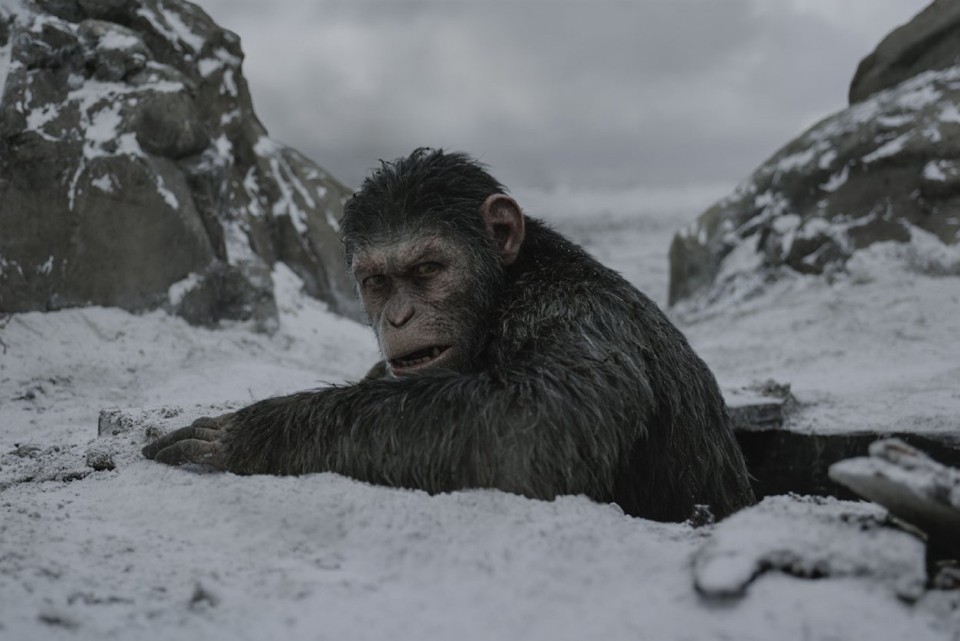AUGUST 7, 2017
All summer, I’ve been bitching about the lack of quality and audience satisfaction from the summer’s crop of tentpole sequels.
Please be honest, was there really any need at all for a “Pirates of the Caribbean 5”? Or a “Transformers 5”? (except for a money opportunity to rake in the bucks from international sales?). This may be a naive question, but cash aside, why bother with tentpole franchises at all? It makes me lose my faith in summer sequels.
Then comes the rebooted “Planet of the Apes” series.
Actually there was a first attempted reboot in 2001 with a film directed by Tim Burton (of all people) with Mark Wahlberg that still featured actors in prosthetic makeup, and although it finally made money, 20th Century-Fox declined to pursue sequels, and most film observers at that time considered the franchise dead.
Film observers were then surprised that Fox would attempt another reboot in 2011 to be called “Rise of the Planet of the Apes,” with scripters Rick Jaffa and Amanda Silver essentially creating a new origin story of how the apes came to power prior to the famous 1968 “Planet of the Apes” with Charlton Heston.
To the surprise of many (including myself), “Rise” was not only good, it was very very good. “Rise” took the series back to the present day where a scientist (James Franco) takes in a baby chimp he has named Caesar, and although he is raised with loving care, Caesar is treated badly by others and rebels, eventually leading an ape army in taking over the Golden Gate Bridge. It was especially thrilling so see Caesar (now performed by Andy Serkis) grow and mature into an ape ready to fight for his species.
The second film in the “Apes” trilogy, “Dawn of the Planet of the Apes” (2014), still has moments in San Francisco, where humans are dying because of a virus that many believe has been spread to them by the apes, but most of the film takes place in the nearby forests where Caesar recollects his troops to protect his species from avenging humans, a group whom he still loves.
But now it’s war. And any of the lightness that was occasionally evident in “Rise” and “Dawn” is now gone. (This is not to put you off from seeing “War” — it’s the best tentpole movie by far this summer, but it’s only to let you know what you’re getting into.) The apes are now almost totally in control, except for a mad colonel (Woody Harrelson) who is adamant about wiping out the rebellious apes so that he can save humankind.
Caesar, who had been open to compromise so that the apes can live in peace, changes his tune when the Colonel attacks the apes’ sanctuary and wipes out his family. Now, it’s on.
I must confess that I found myself a little disoriented by the film’s first hour with apes frolicking everywhere in the forest but leaving me with a feeling of disorientation — :”who is this ape again and why is he there?” For me at least, things only really clicked in the second hour when Caesar and a ragtag crew attempt an assault on the Colonel’s fortress to try to free the apes whom the Colonel’s minions have captured and placed into cages, not unlike the cage into which Charlton Heston was thrown in the 1968 original.
Yes, the final battle scene is filled with CGI, the computer-generated-image system upon which all summer tentpoles seem to rely. Normally, I’m hard on CGI, but the work here is pretty remarkable. This new reboot is the first series that doesn’t rely on actors in monkey suits, and the series is all the better for it.
Harrelson is fine as the Colonel — many reviewers have detected a bit of Trumpism is his portrayal, as he wants to build a wall. Yet I feel he is much closer to Col. Kurtz in Joseph Conrad’s novel “Heart of Darkness,” and that influence works throughout the film as one bit of graffiti in a Colonel-dominated cave reads “Ape-pocalypse Now.”
But “War For the Planet of the Apes” is really all about the bravura work of actor Andy Serkus, who brings a beating heart to the character of Caesar. Several critics have dismissed Serkis’ work as merely motion-cpature as if that was something less than acting. Don’t. For evidence, please click here to see how Serkis’ brilliant acting talent has brought Caesar to life. And after seeing it, I defy you to tell me that that is not acting.
“War” brings us up to the moment in which Charlton Heston enters the story, which began way back in 1968. But that original “Planet of the Apes” film, as much as our nostalgia for it may color our opinion, never reaches that depth of character than “War For the Planet of the Apes” achieves.
If you’ve been skipping over this film as yet another tired summer sequel, don’t. If it’s playing at a theater near you, run, don’t walk.
GRADE: B+












